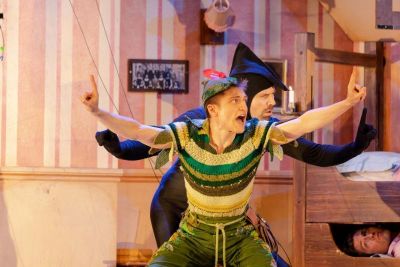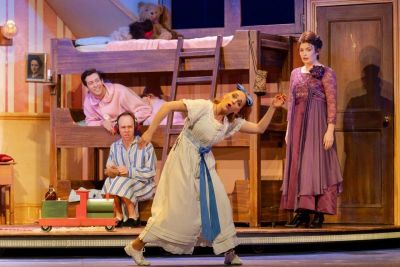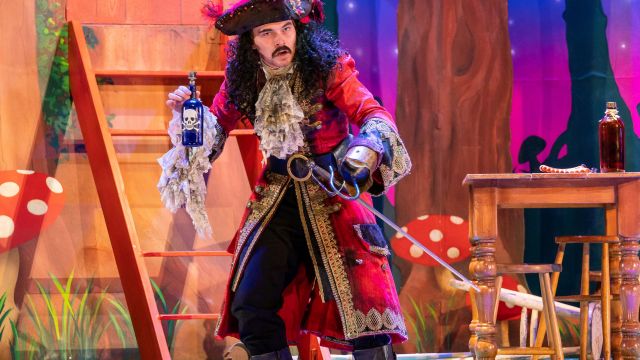Peter Pan Goes Wrong
Chaos is returning to the stages of Australia with the The Cornley Polytechnic Drama Society’s biggest disaster to date, Peter Pan Goes Wrong. Two of the writers, Henry Lewis and Jonathan Sayer, explained exactly how to stuff things up to David Spicer.
When Henry Lewis was coming home from High School one day he realised that he had forgotten the key.
“It was pouring with rain, so I attempted to get into my own house through the dog flap which we had in the back door to the kitchen,” he recalls.
Half way through the dog flap something went wrong.
“I got stuck. My Mum’s boyfriend had to come around (with tools) and saw me out. Which is exactly what happens in the play.”
Henry said his family love that scene in Peter Pan Goes Wrong, although “when I was fifteen my mother did not see the funny side.”
The team from the Mischief Theatre Company in London first staged The Play That Goes Wrong in a room above a pub. According to the website WhatsOnStage there were only four people in the audience. The cast were working in call centres and pubs.
Fast forward to now and The Play That Goes Wrong has been seen by a quarter of a million people and counting. Its international success allowed the company to be much more ambitious with their second production.
“The Play That Goes Wrong is set in one location – an old manor house - whereas Peter Pan goes to Neverland, (flies to) London and goes underwater,” said writer Jonathan Sayer with relish.

“There is some real spectacle. We use a revolve that is one of the fastest in the world. The amount of engineering is incredible. Every time it goes around we use a different comedic language and the set becomes ever more dangerous. You get to see the Pirate ship looking like an absolute death trap.”
Thankfully there have been no serious injuries in any production, but occasionally things have gone wrong – in an unplanned way.
“There is a moment when Peter Pan flies too high up into the rig. His wires get caught and he falls to the floor,” said Henry.
“That effect is achieved by having the actor fly out of sight. Then we don’t really drop the actor. We have a dummy which is weighted, wearing the correct costume, which looks like a falling person. The dummy falls down behind the rocks of the lagoon.
“We had a big problem one night during the tour of Peter Pan, when the mannequin fell while Peter Pan was in the scene below and fell on him. It was quite a surreal moment - Peter Pan standing there and another Peter Pan ploughs out of the lighting rig crushing him.”
The writers say the audience’s familiarity with the story of Peter Pan also allows them to quicken the pace of the comedy. They don’t need to show the audience what was meant to go right.
“They are one step ahead of the characters on stage. The audience knows about certain iconic moments such as when Peter Pan flies through the window and his shadow starts running around the (children’s) room,” said Jonathan.
Both writers have appeared in the production. Henry played the actor Robert, whose roles are Nana the dog, Peter’s shadow and Starkey the Pirate. Jonathan modelled the character of Dennis (John, Darling and Smee) a little on himself.

In The Play That Goes Wrong, Dennis knew most of his lines but he could not remember certain words and mispronounced them. He scribbled them on his hands, but it didn’t help. In Peter Pan things go from bad to worse. During the play’s development the team made him more and more forgetful.
“By the time the play was fully developed, Dennis had big headphones on, so all of his lines are being fed to him,” said Jonathan.
“We heard this story about a play running in the West End, with the actor having lines fed through an ear piece. That is a very funny idea. We started dreaming up all the mistakes that could happen.
“As the show goes on Dennis picks up on arguments happening backstage, including on politics, and repeats them. We also learn there is a marital breakdown going on backstage.”
So how do you practise to forget lines?
“You don’t know them in the first place,” he jokes. On the contrary, it requires extra preparation.
“We had a lot of practise, playing those characters a long time.
“Dennis is based (a little) on how I respond under pressure, but an extremely heightened version (of me.)”
So how does Dennis respond poorly to pressure?
“He could either fight or flight. Dennis does neither, as he is too terrified. He doesn’t run away because he is paralysed in fear. He does not fight to combat it. He grinds to a halt.
 “That is why he repeats anything he can hear, because he does not have the imagination to get himself out of the problem. He just blindly follows whatever any other character wants him to do.”
“That is why he repeats anything he can hear, because he does not have the imagination to get himself out of the problem. He just blindly follows whatever any other character wants him to do.”
By contrast, Jonathan says, when some of the other characters make a mistake they assume it is someone else’s fault.
“Whereas Dennis will assume it is his fault. He is a pathetic. He is an easy target and fun to laugh at.
“You kind of hear what is being said to him. At one point he says, ‘good night mother’, then he repeats ‘no, speak with feeling for God sake’, ‘no, no, don’t say that’, ‘stop saying that’, ‘stop repeating me’, ‘shut up you idiot’.”
Henry Lewis has experienced the blind panic of something going wrong in an amateur production.
“I did a production of Peter Pan at an amateur theatre in West London over Christmas.
“At one point the Lost Boys had to build a Wendy house around Wendy when she was first shot down over Neverland. The first time we saw this Wendy house was during the first performance, as we had not had it during the rehearsal. Unfortunately, it was the most complicated flat pack anyone had ever seen. We started to put it together, finding the right nuts and bolts, but there was only a bit of narration to do it, so we were not able to put it together very well.”
Henry described it as “not a perfect moment in theatre”.
 By contrast with the narrative of their plays, everything seems to be going right for the Mischief Theatre Company. Their productions have been seen in 20 different countries, from China to Argentina. On Broadway J.J. Abrams (of Star Trek fame) was the director. Other works they have penned include A Bank Robbery, A Christmas Carol Goes Wrong and The Nativity Goes Wrong. On the wish list also for the future is a magic show that goes wrong.
By contrast with the narrative of their plays, everything seems to be going right for the Mischief Theatre Company. Their productions have been seen in 20 different countries, from China to Argentina. On Broadway J.J. Abrams (of Star Trek fame) was the director. Other works they have penned include A Bank Robbery, A Christmas Carol Goes Wrong and The Nativity Goes Wrong. On the wish list also for the future is a magic show that goes wrong.
The BBC has broadcast two television specials and the team has recently set up a new television production company.
When I spoke to the writers, they were about to spend the weekend in Moscow for the Russian premiere of The Play That Goes Wrong.
So does the world have the same sense of humour? Do Bulgarians laugh in the same place as the Japanese?
Jonathan’s answer was surprising.
“I find it staggering people laugh at the same thing. People are united at what makes them giggle.”
Peter Pan Goes Wrong is at The Playhouse, Arts Centre Melbourne from 19 December; Canberra Theatre Centre from 6 February; Sydney Lyric Theatre from 13 February; Her Majesty’s Theatre, Perth from 7 March.
Images from the Australian production.
Subscribe to our E-Newsletter, buy our latest print edition or find a Performing Arts book at Book Nook.

